Societal Divisiveness and Employee Experience
By Margaret Faso
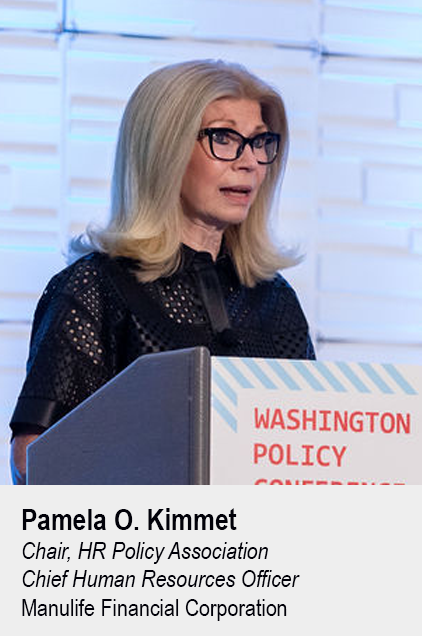
| HR Policy Association Chair Pam Kimmet welcomed attendees to our Washington Policy Conference, designed to give CHROs context and tools to chart a thoughtful path forward during tumultuous workplace change. She noted the key forces in play: the Biden administration’s “all of government” approach now in full swing, increasing societal frustration with partisanship ahead of the 2024 elections, and differing workplace expectations among employees depending on location and demographics. She charged that HR leaders need to serve both as stabilizing force and change agent as they juggle the talent and workplace implications of this transformational time. |
Scroll below for detailed summaries of the discussions, or click the links to skip ahead.
- Former Senators: Compromise and Local Involvement Essential to Improving Politics
- Americans Turning to Corporate Leadership Amid Political Dissatisfaction
- Bipartisanship Does Exist!
- Flight Attendants’ Leader and NLRB General Counsel Tout Unionization
- CHROs: Understanding Employee Voice Critical in Uncertain Times
- EU to U.S. on Pay Transparency: We Come From Your Future
- The Voice of the Latino Worker
- CHROs Discuss Approaches to DEI, AI, Employee Experience
Former Senators: Compromise and Local Involvement Essential to Improving Politics
By Gregory Hoff
Former Senators Claire McCaskill (D-MO) and Ben Sasse (R-NE) offered their perspectives on the current political and policy environment on Capitol Hill, how policymaking has changed since they each entered office, and their future expectations.
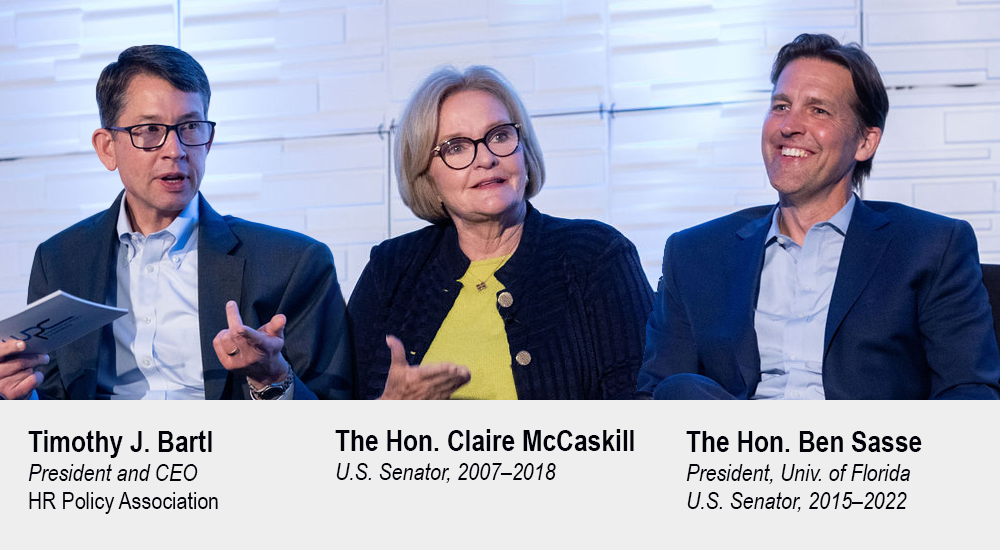
Digital revolution changed politics: Sens. Sasse and McCaskill both emphasized how the advent of digital media, and particularly social media, has expanded political discourse but inhibited compromise-driven policymaking in a discussion led by HR Policy CEO Tim Bartl.
- Both speakers highlighted the growing extremism within each party and how social media is constantly elevating the most extreme or controversial viewpoints at the expense of the majority of individuals in both parties that tend to have more moderate views.
- “It is amazing how disconnected political discussions are from what people actually care about,” said Sen. Sasse.
- “There is no longer any reward for compromising,” said Sen. McCaskill, and “the people who make the most noise have no interest in compromise.”
Less local, more vocal: Both Senators emphasized that more political campaigns are increasingly fueled by money outside of the office’s district or state and national interests, rather than focused on the people the office represents. Sens. McCaskill and Sasse noted that they focused on doing as many town hall meetings in their respective states as possible, while their opposition leaned on media attacks and outside funds.
Other highlights included:
- Sen. Sasse emphasized the importance of returning to a true separation of powers as contemplated by the Constitution, rather than an overly powerful executive branch, inertia in the legislative branch, and policymaking from the judicial branch.
- Both Senators emphasized the need for campaign finance reform, including full transparency of where donations are coming from.
- The speakers emphasized expanding voter participation and marginalizing extreme views.
Americans Turning to Corporate Leadership Amid Political Dissatisfaction
By Margaret Faso
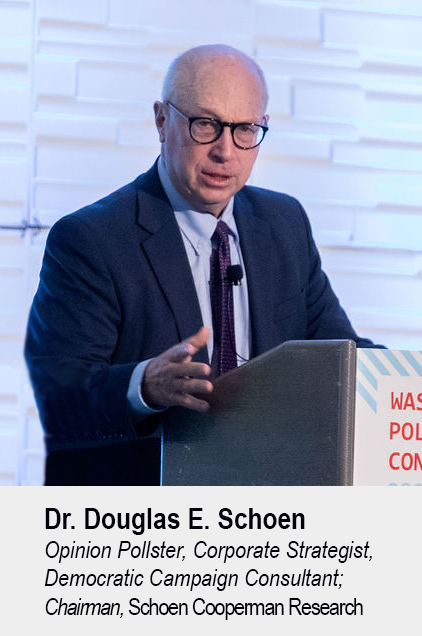
| Unsettled anger in our country is creating significant dissatisfaction with both political parties, according to keynote speaker Doug Schoen, Opinion Pollster, Corporate Strategist, and Democratic Campaign Consultant.
|
“Unsettled times.” Mr. Schoen remarked on the unprecedented times we are living in with the top Presidential candidates facing personal and legal challenges. With confidence in both front runners so low, perceptions of the economy still negative, and further indictments seemingly strengthening Trump’s support, whoever the next President is, they will be divisive.
Corporate leadership has become a source of stability. At a time of significant political disruption, company culture and presence in the community often steps in as an anchor for people. Schoen urged attendees to understand the importance of their role in shaping conversations around divisive topics.
Bipartisanship Does Exist!
By Ross Neely
A conversation about the importance of bipartisanship, and the vision for future bipartisan policy work featured two Members of Congress, Republican Stephanie Bice (R-OK) and Democrat Chrissy Houlahan (D-PA). They discussed the current political environment, paid leave and workplace issues, led by Chatrane Birbal, Vice President of Public Policy and Government Relations.
- The panel offered insights into their efforts to develop a federal paid leave program.
- The discussion emphasized how bipartisanship is more common than realized.
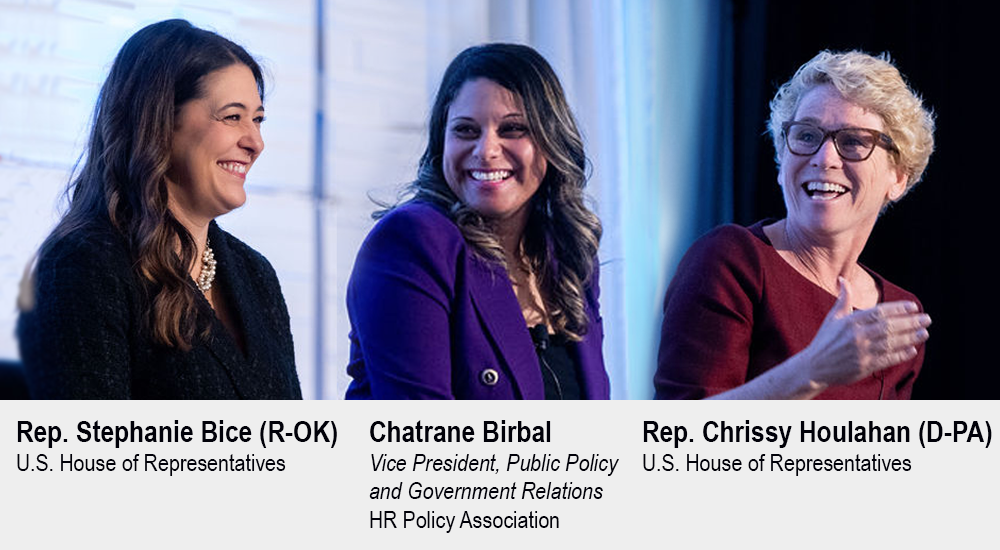
“Know that your members of Congress are working for you, even if it might not be that apparent when you turn on the news,” stated Rep. Bice when discussing the importance of bipartisanship in Congress. Both lawmakers shared how bipartisanship fosters cooperation and consensus-building among lawmakers from different political backgrounds, and how it enables the passage of substantive legislation that reflects broader viewpoints and priorities.
Shared experiences led to paid family leave working group. The pair began their conversation by sharing the story of how they forged a friendship while serving in the House of Representatives. This connection, through shared experiences, eventually gave rise to the establishment of a bipartisan working group dedicated to creating a federal paid family leave system that eliminates the existing fragmented access experience by many families.
“Paid family leave presents a multifaceted challenge” that will require bipartisan support from both chambers of Congress, stated Rep. Houlahan. The working group intends to examine both effective and unsuccessful approaches to paid leave, by having conversations with different stakeholders. Both members stated that they are committed to exploring strategies to narrow the disparity between Americans who have access to generous paid family leave benefits and those who have none. The working group is aiming to create a federal paid family leave system that eliminates the existing fragmented access experienced by many families.
“The workforce is quickly changing, and we must work in step with these changes in order to make effective policy,” stated Rep. Houlahan. The panel closed by discussing efforts between different caucuses in tackling these challenges, and how these solutions must be bipartisan efforts.
Flight Attendants’ Leader and NLRB General Counsel Tout Unionization
By Chatrane Birbal
Sara Nelson, the International President of the Association of Flight Attendants-CWA and Jennifer Abruzzo, General Counsel at the National Labor Relations Board, offered their perspectives on employee voice and representation in the workplace.
- Nelson asserted that the employer does not deserve a voice in employee relations and/or unionization issues.
- Abruzzo doubled down on her aggressive policy actions and emphasized the broad scope of employee protected activity.
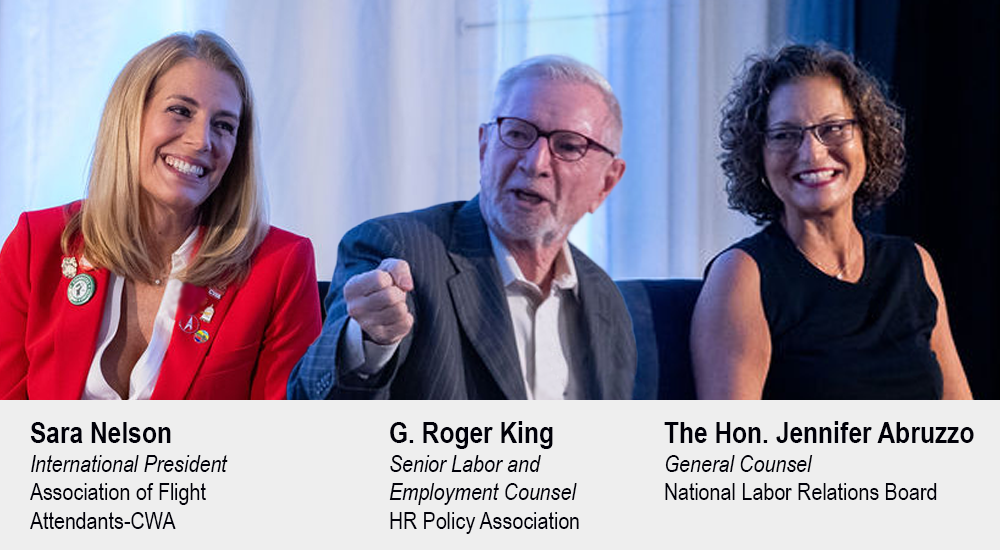
During the discussion, Nelson referred to the ongoing UAW strike and highlighted the importance of collective bargaining to address labor issues. She noted there is frustration among workers nationwide due to stagnant wages. Nelson represents 50,000 flight attendants, members of the Association of Flight Attendants-CWA. Nelson noted that all companies should have organized workforces as “employee voice is very critical.” She also explained how she leverages relationships with other unions to understand and identify labor issues that are bubbling and need to be addressed.
Jennifer Abruzzo doubled down on the need to protect workers' rights. On the issue of non-compete agreements, Abruzzo noted such clauses negatively impact workers and their ability to engage in collective action, adding that “it’s all about equalizing bargaining power.” Furthermore, she observed that non-competes are unlawful in most situations, and that the NLRB will decide its interpretations based on Board law and Supreme Court precedent.
Captive Audience Meetings on Ice: Employer voice was also discussed, including the issue of mandatory employee meetings providing the company’s view on unionization. Abruzzo stated that companies shouldn’t “mandate” that workers sit and listen; just make such convenings “voluntary.”
Looking Ahead: Abruzzo noted she was focused on “handbooks, AI and protected concerted activity”, citing concerns raised about electronic monitoring becoming too intrusive and inhibiting workers' rights. Abruzzo is calling on the Board to assess employers' technology to safeguard workers' Section 7 rights.
CHROs: Understanding Employee Voice Critical in Uncertain Times
By Ross Neely
Roger King, Senior Labor and Employment Counsel at HR Policy Association led a panel of CHROs in a discussion covering employee voice issues, workplace rules and policies, the intersection of permissible incivility in the workplace and the need to maintain a harassment-free workplace, and the NLRB focus on electronic workplace monitoring.
- The panelists offered insight into the need to regularly engage with employees, and that employers need to give employees a voice and options for staying continually engaged.
- “The importance of employee voice in the workplace cannot be overstated.”
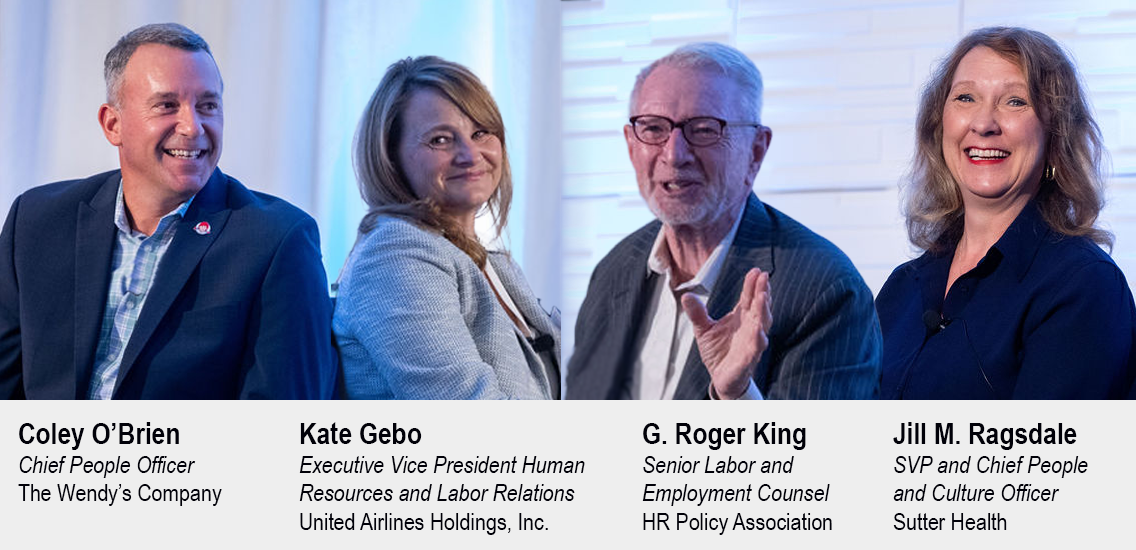
The potential ripple effect of sectoral bargaining. Coley O’Brien of The Wendy’s Company provided valuable insights regarding the implications of the compromise negotiated in the Fast-Food Accountability and Standards Recovery Act in California for the broader landscape of collective bargaining in the states. He indicated that this legislative-enabled sectoral bargaining could extend beyond the fast-food industry, influencing other sectors and states. Kate Gebo, who leads HR for United Airlines, drew parallels between recent airline industry collective bargaining and the concept of sectoral bargaining, noting that the major airlines all followed each other in collective bargaining, resembling the coordinated approach characteristic of sectoral bargaining practices.
Remain agile in response to the evolving workforce. Mr. O'Brien noted that in the contemporary and dynamic work environment, employees are pursuing a comprehensive employment package. This encompasses not only competitive salaries but a healthy work-life balance including time off, enhanced benefits, and, most significantly, greater flexibility in work arrangements, acknowledging the changing expectations and priorities of today's workforce.
Nurturing employee voice. Jill M. Ragsdale of Sutter Health underscored that the value of employee voice is immeasurable, highlighting how it serves as a catalyst for fostering engagement, driving innovation, and igniting creativity by providing a platform for employees to share their distinctive perspectives and innovative ideas. She further stressed that employers must actively cultivate an environment where employees not only have a voice but also a range of options, recognizing that employee voice is a powerful tool for staying continuously engaged and well-informed about the evolving needs and aspirations of the workforce.
Together, these insights highlight the dynamic nature of today's workplaces and the pivotal role that employees play in shaping the future success and sustainability of an organization. The panelists emphasized the importance of engaging with employees, and how companies must adapt in an ever-changing environment.
EU to U.S. on Pay Transparency: We Come From Your Future
By Margaret Faso
A panel focused on the geopolitical, social, and economic forces that confront global companies explored the ways employers can effectively engage with a diverse group of stakeholders while adapting to rapidly changing legislative and regulatory landscapes across the globe.

Is the EU Pay Transparency Directive the future of U.S. pay equity? Opening the conversation, Alan Wild stated that as policy issues move around the globe, companies in the U.S. should take note of legislation and regulation abroad, particularly in Europe on pay transparency and pay equity. In fact, consider it a “we come from your future” conversation, Wild said. While pay transparency laws are popping up in U.S. states, the EU directive on pay transparency is one of the more complicated and robust initiatives around the globe. Not only does the EU Equal Pay and Transparency Directive require a significant increase in the reporting obligations of member states but presents a footprint for what we could see in the U.S.
EU directive focuses more on gender than race. While the requirements themselves would be new to the U.S., Lisa Salas, Director of Labor Relations, Europe, DXC Technology, noted that American companies can use their experience with other reporting requirements in the U.S. to prepare for any upcoming pay transparency obligations.
ESG has pivoted the HR role to be much more externally focused, said Lee Caulder, VP of Global Labor and Employee Relations, Albemarle, which means communications plans need to be set to talk to employees about increased data collection. Employees also feel as though they are working with a purpose when their company is more externally focused through ESG.
Global union movement turned language from labor rights to human rights. The shift in how union movements are seen allows them to gain more attraction and following, argued Wen Dong, HR Policy’s Director of Labor Affairs. While many companies in the U.S. believe that high levels of employee engagement better protect them from union organizing, this is not the case globally. Given the shift in conversation from labor rights to human rights, U.S. employers may not always have that protection.
The Voice of the Latino Worker
By Megan Wolf
In a presentation of the Latino Worker Project, members heard directly from Latino employees on the importance of working for employers that value hard work, entrepreneurship, and family.
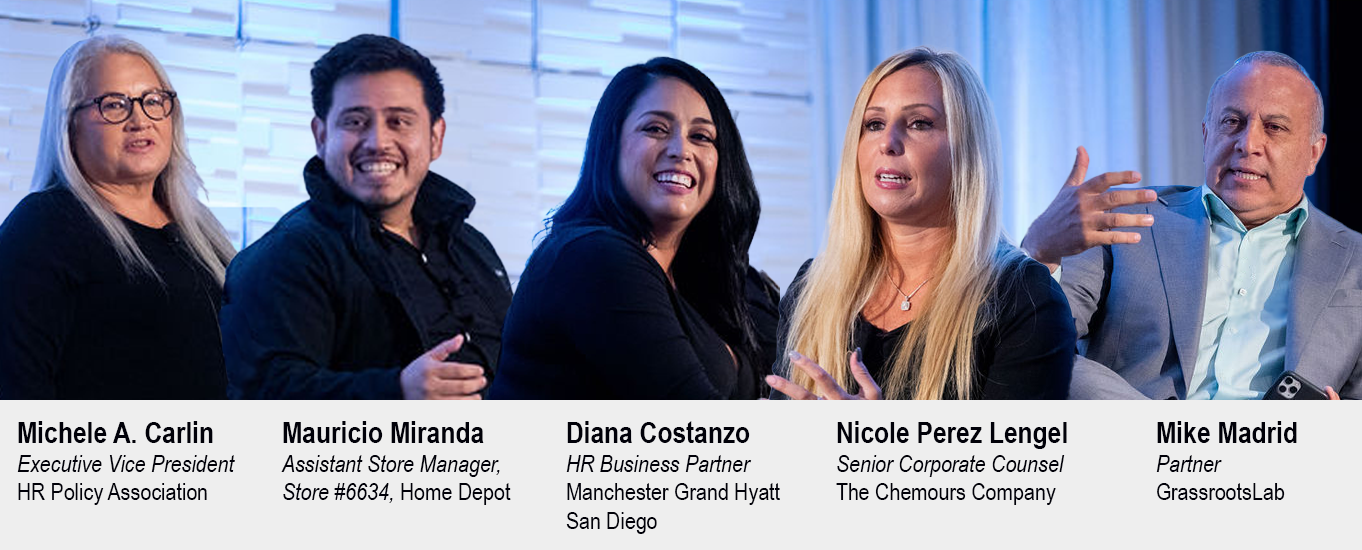
Shelly Carlin, Executive Vice President at HR Policy Association and Mike Madrid, Partner at Grassroots Lab presented their findings of the Latino Worker Project, a study that examined the Latino experience at work and how companies can evolve their talent strategies to adapt to this growing workforce population.
Cultural themes emerge. Employees from The Home Depot, Hyatt, and Chemours shared personal accounts of how Latino culture has influenced their attitudes and behaviors at work. At the heart of their stories – along with those that came to light from interviews with over 150 Latino workers from 15 HR Policy companies – are the important themes of family, close working relationships, and a strong work ethic.
Family. Nicole Perez Lengel, Senior Corporate Counsel at Chemours, spoke about the influence of her parents on becoming a Latina attorney and the sense of responsibility she has to her parents, including working hard to achieve success, for the sacrifices they made that allowed her the opportunity to attend law school.
Trusting working relationships. Diana Costanzo, HR Business Partner at Manchester Grand Hyatt in San Diego, emphasized that building a “work family” – close relationships with peers at Hyatt – has allowed her to survive challenging times after taking on her first HR business partner role immediately prior to the pandemic. She spoke highly of Hyatt’s community-focused culture and how it aligns with her values as Latina in taking care of the people around her.
Strong work ethic. Mauricio Miranda, Assistant Manager of Store #6634 at The Home Depot in San Diego explained how his company empowers him to feel like an entrepreneur by giving him the right tools, guidance, and leadership. He views his relationship with the company as mutually beneficial because of the growth opportunities that emerge when he works hard and because he feels like the company takes care of him. This motivates him to have a positive impact with everyone he encounters at work. Mauricio has recruited several friends and family members for various roles at the company.
The Path Forward for CHROs. Communicate the elements of your employment value proposition that best resonate with Latino workers – good, secure jobs in collaborative workplaces that offer flexibility to "fit work into life." Leverage the Latino Worker Project’s six strategies for employers to navigate these transformational workforce changes in the coming years.
Learn more. The Latino Worker Project was featured in a story in La Opinion, the largest Spanish language newspaper in the United States, and in opinion editorials by Madrid and Carlin, published in the Los Angeles Times and the Dallas Morning News highlighting the implications for employers to recruit and retain Latinos.
CHROs Discuss Approaches to DEI, AI, Employee Experience
By Wenchao Dong
An all-CHRO lightening round panel titled “Bringing it All Together” discussed how CHROs develop a reasoned perspective and response to the issues discussed during the day. These included the impact of the Harvard decision, incorporating artificial intelligence, the heightened attention to employee voice and union organizing and evolving approaches to employee engagement.
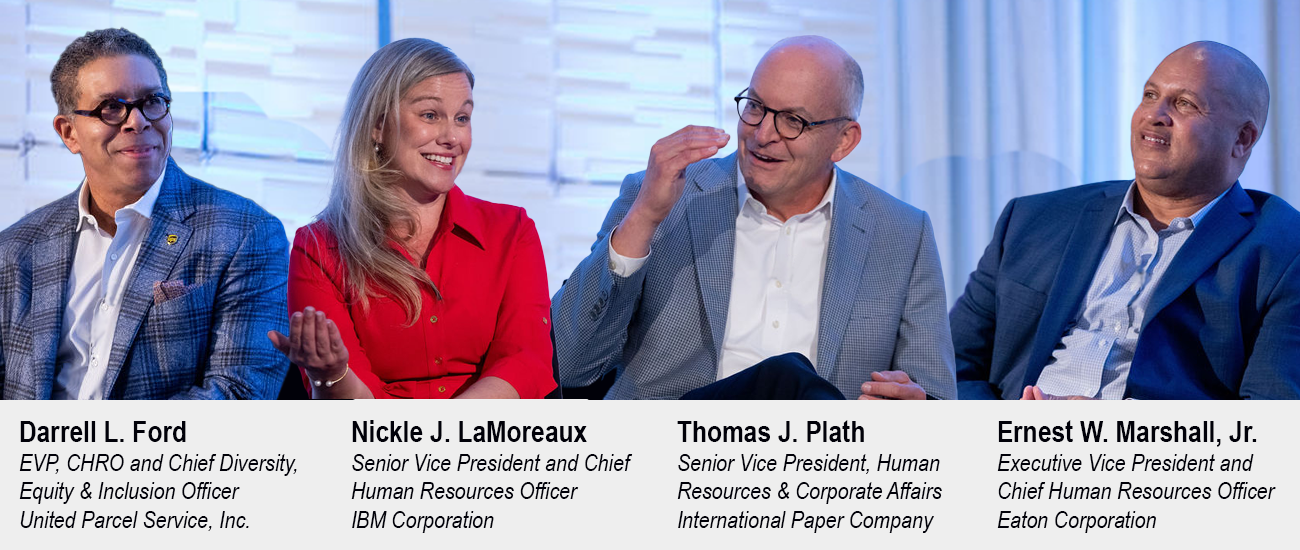
HR essential to leadership voice on diversity. Moderated by Darrell Ford, EVP, CHRO and Chief Diversity Officer of UPS, the panel discussion began with the recent Harvard decision which has caused companies to reevaluate their diversity programs and reassess their priorities. Ernest Marshall, CHRO of Eaton, shared that it is important for organizations to “know where they stand” and “be the voice of what is right.” Nickle LaMoreaux, SVP and CHRO of IBM, discussed the importance of both internal and third-party assessments of diversity initiatives. She emphasized HR leaders need to educate employees and board members about what affirmative action and diversity efforts are to avoid any misinterpretation.
Unifying the CEO and board on DEI decisions. Explain how diversity and human capital strategies are integrated into broader business strategies to get your boards and CEOs to look at the big picture, advised Tom Plath, SVP, HR and Corporate Affairs, International Paper Company. Mr. Marshall also suggested looking at the composition of the board when DEI conversations take place.
Define AI before moving forward on how it will be used. Ms. LaMoreaux shared that it is important to “level set first and put principles in place for how, when, and where you will use AI.” For IBM, AI will impact business and human resources operations and for that purpose, IBM has developed the following principles:
- AI is not a decision maker. Managers are the final decision makers while AI provides recommendations.
- All AI algorithms should be scalable and constantly monitored to avoid bias.
- The AI process should be transparent – anybody interacting with AI can understand the data sources and how it makes recommendations.
- AI should not be used for talent acquisition.
What do employees want to tell us? As employers face rising union and labor activities and changing employee expectations and expressions, Mr. Plath advised the audience to think of two questions: What do our employees want to tell us? And what do employees want to hear from us? He further explained that the answers to these two questions, framed by transparency, follow-up, and recognition help companies build individual relationships, enhance engagement, and give a purpose to work.